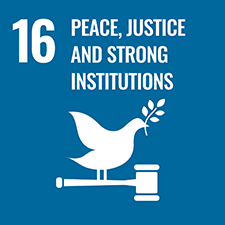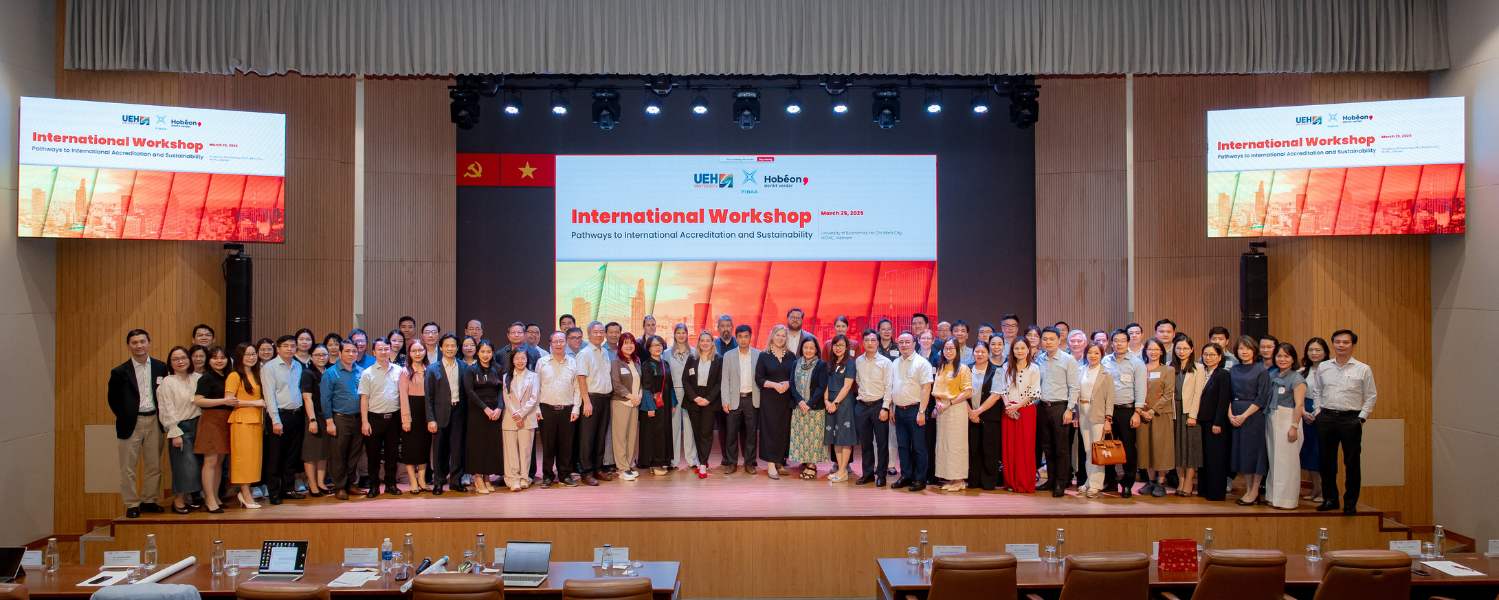
Innovation in international accreditation is to assist Vietnamese higher education in keeping up with world trends
26 Mar, 2025
The trend of international accreditation is changing as follows: accrediting training programs that meet international standards as well as promoting higher education institutions towards transforming “digital education” and “sustainable development” is what has been stated at the “Pathways to International Accreditation and Sustainability: The Pathway to International Accreditation and Sustainable Development” International Workshop co-organized by FIBAA and the University of Economics Ho Chi Minh City (UEH).
The current development trend of modern higher education is concentrating on three main factors as follows:
1. International accreditation: Conducting the process of evaluating and recognizing the educational quality of a training institution or training program in accordance with the international standards conducted by independent accreditation organizations.
2. Digital Education: Applying digital technology to the teaching, learning and educational management process.
3. Education for Sustainable Development (ESD): The process of integrating sustainable development principles and goals into the education system is to equip learners with the knowledge, the skills and the attitudes necessary to address global challenges, linked to the 17 United Nations Development Goals (17 SDGs) like climate change, resource depletion, social inequality and economic issues.
These essential requirements are to ensure that higher education institutions improve the quality of training and research; expand access to knowledge, personalize learning experiences; enhance global competitiveness and cooperation; and commit to bringing sustainable values to the learners and the community.
In response to the innovative requirements of modern education, the FIBAA International Accreditation Organization from Germany has made important changes in the international accreditation trend - integrating standards on digital education and sustainable development.
Being a key national university, University of Economics Ho Chi Minh City (UEH) has recently made efforts to implement a comprehensive university digital transformation strategy and a Sustainable University strategy. Up to the present time, this journey has achieved remarkable results; on the other hand, UEH has faced many challenges that need to be overcome.
With these practical plannings and implementation experiences, on March 25, 2025, University of Economics Ho Chi Minh City (UEH), FIBAA and Hobéon jointly organized the “Pathways to International Accreditation and Sustainability” international conference with the purpose of sharing experiences, discussing management and quality improvement for sustainable development in addition to promoting Vietnamese higher education to keep up with the latest trends.
This conference attracted a lot of attention and participation from the Department of Quality Management (Ministry of Education and Training of Vietnam), quality assurance experts from FIBAA, Hobéon together with other officials and leaders from nearly 50 Vietnamese higher education institutions nationwide in Vietnam.
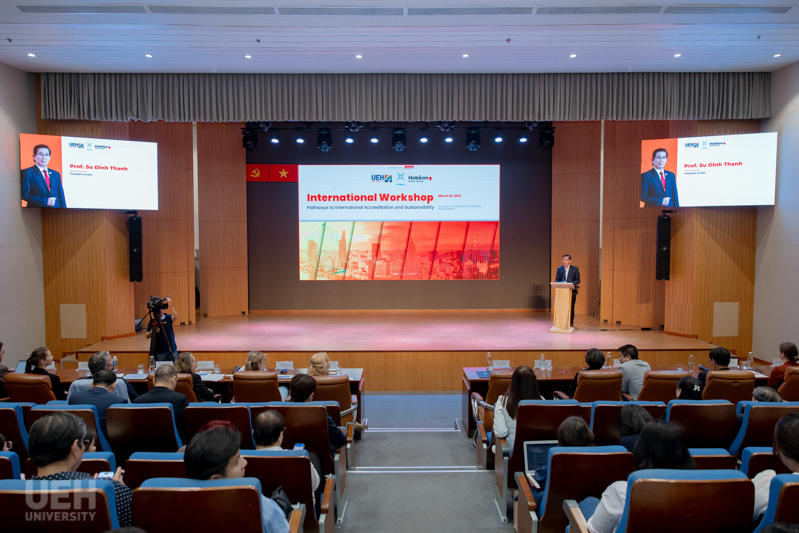
Overview of the seminar at UEH-B1.302 on March 25, 2025
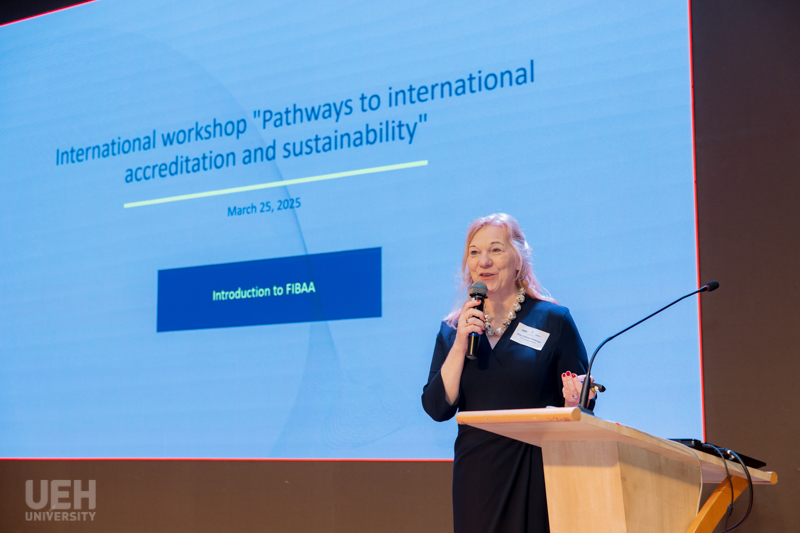
Ms. Mag. Diane Freiberger, Director of FIBAA, delivered the welcome speech at the seminar
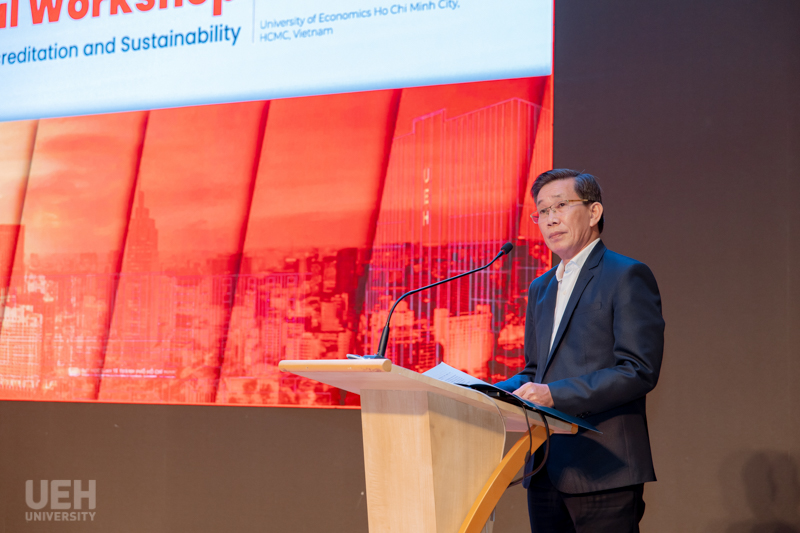
Prof. Dr. Su Dinh Thanh, President of UEH, delivered the welcome speech at the seminar
“I do highly appreciate the efforts by the University of Economics Ho Chi Minh City (UEH) and the FIBAA Accreditation Organization in successfully coordinating this “Pathways to International Accreditation and Sustainability” international conference. This is a meaningful event for Vietnamese higher education institutions upon personal viewing from FIBAA’s practical perspective - a foreign accreditation organization after more than 03 years evaluating Vietnamese training programs and higher education institutions and from the perspective of the insider: University of Economics Ho Chi Minh City (UEH)” is what was shared by Ms. Tran Bich Hue - Head of Unit of Education Quality Accreditation Management, Department of Quality Management - Ministry of Education and Training.
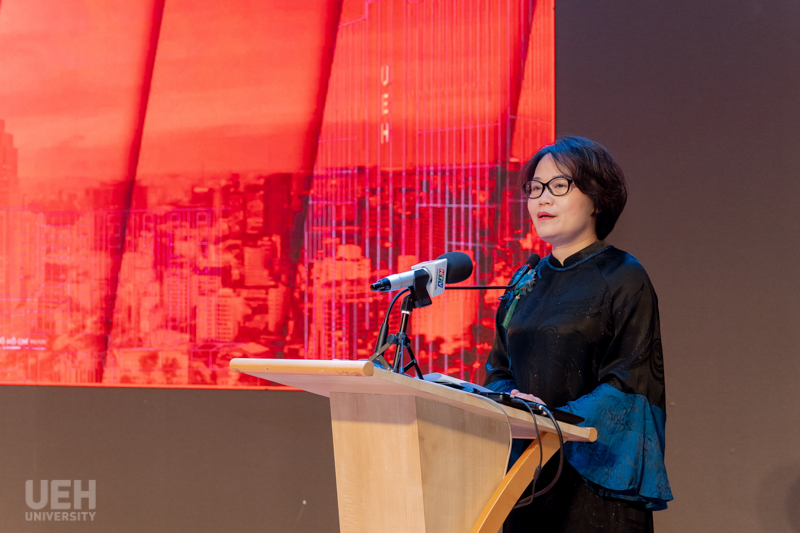
Ms. Tran Bich Hue, Head of the Educational Quality Accreditation Management Department, Quality Management Authority - Ministry of Education and Training, delivered the opening speech at the seminar
Within this conference framework, the experts presented the following important contents:
• “New points in FIBAA’s International Program Accreditation” with the presentation of Dr. Nina Rotermund - Head of FIBAA International Accreditation Procedures Department and Ms. Yuliia Bleshmudt - Deputy Head of FIBAA International Accreditation Procedures Department.
• “Digital Education Development Strategy and Implications for Vietnamese Universities” and Introduction of “Excellence in Digital Education”® Certification with presentations by Mr. Michael Stephan - Head of FIBAA Certification Department and Ms. Christiane Butler - Deputy Head of FIBAA Certification Department;
• “Sustainable University Development Strategy” and Introduction of “Sustainable University” certification - SHE (Sustainability in Higher Education) with presentation by Mr. Roel van Krieken from Hobéon;
• “UEH Sustainable Strategy: 5 years of action - A pioneering university in digital education transformation and sustainable development in Vietnam” with presentation by Assoc. Prof. Dr. Bui Quang Hung – Vice President of UEH.
The success of the “Pathways to International Accreditation and Sustainability” International Conference not only provided important information to help Vietnamese higher education institutions successfully develop according to the modern higher education model but also contributed to enhancing the position of Vietnamese higher education on the world map.
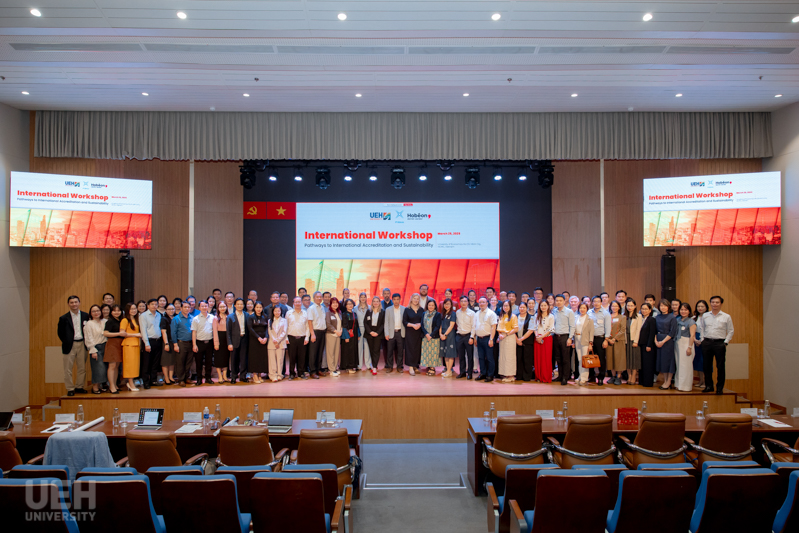
Delegates posed for a commemorative photograph at the seminar
DETAILED INFORMATION
Accreditation of training programs - New information
In the presentation on the “FIBAA International Accreditation of Training Programs” topic, Dr. Nina Rotermund - Head of FIBAA International Accreditation Procedures Department - shared further information regarding the revised Training Program Quality Standards, the training program accreditation process and the latest updates in the FIBAA assessment guidelines.
Accordingly, the latest FIBAA Accreditation Standards for Training Programs are based on 46 criteria, in which 24 are mandatory (Asterisk Criteria). If a program does not meet 5 of these criteria, recognition will be denied.
FIBAA's assessment criteria focus on: Curriculum objectives, Consistency in curriculum design and application in practice; Internationalization capacity, Professional competence and students’ employability; Inclusive and equitable education (SDG 4), and Quality assurance. Concurrently, the Standards have updated the following new points listed as: Integrating Artificial Intelligence (AI) in teaching and assessment; Enhancing diversity and inclusion in the educational environment (SDG4) in additiont to cutting down the number of assessment criteria from 54 to 46 criteria.
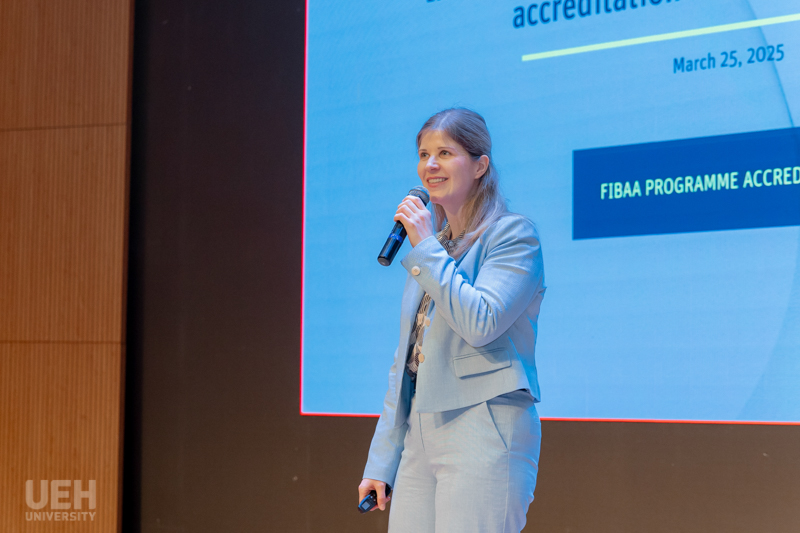
Dr. Nina Rotermund, Head of the International Accreditation Procedures Department at FIBAA, shared insights on the latest developments in FIBAA’s accreditation processes
Successfully accredited programs will receive the FIBAA Quality Seal - an international quality certification; what is more, excellent programs can be awarded the FIBAA Premium Seal. This helps to enhance the reputation and the brandname of higher education institutions and training programs in the international market; increasing opportunities for international cooperation with other universities and educational organizations; attracting international students and lecturers; supporting graduates in the recognition of degrees and the search for global employment opportunities; and encouraging continuous improvement in program design and teaching methods.
In addition, within the framework of the workshop, FIBAA representatives introduced a prominent initiative of FIBAA - the UniBridge platform that connects more than 400 universities from more than 30 countries, helping these institutes cooperate in academic projects, student exchanges, and expand international networks.
“Through strict quality standards and innovative initiatives, FIBAA continues to accompany Vietnamese Universities on the journey towards improving the quality of education and international integration” is what Ms. Mag Diane Freiberger, Director of FIBAA emphasized.
*View the detailed presentation on “FIBAA International Program Accreditation” HERE.
*View the detailed presentation introducing FIBAA and the UniBridge platform HERE.
Digital Education Development Strategy and Implications for Vietnamese Universities
Digital education is becoming one of the prominent trends in higher education in Vietnam. With the development of technology and the need for flexible learning, Universities are increasingly interested in implementing digital teaching methods.
Mr. Michael Stephan - Head of FIBAA Certification Department – stated that FIBAA has recognized many bright spots in digital education in Vietnam through surveys and assessments. To be presented as follows:
• Strategy: Most Vietnamese universities are adopting a blended learning model with most face-to-face learning and some online components.
• Staff: Lecturers are trained to use online tools listed as Zoom, Google Meet, Microsoft Teams and LMS systems.
• Technology infrastructure: Developing public service portals and smart libraries like the model of University of Economics Ho Chi Minh City (UEH).
• Teaching design: Enhancing online classes with the participation of international lecturers, and using video recording to support students.
• Quality assurance: Universities are building digital education quality assurance systems, helping students maintain their studies in difficult situations.
Concurrently, Mr. Michael Stephan proposed that an effective digital education strategy should focus on the following factors: Minimizing barriers against learning through digital technology; Equipping students with digital skills and adapting to the modern working environment; Using virtual reality technology to simulate real-life learning situations; Digitizing learning and administrative processes to improve operational efficiency; Developing teaching methods that meet the expectations of the modern student generation.
In order to encourage and to recognize efforts in Digital Education transformation, FIBAA officially offers the “Excellence in Digital Education”® certification to Universities that meet the strict standards for Digital Education. The certification process includes: Self-assessment report (analyzing and presenting achievements in digital transformation); Online evaluation workshop (experts from FIBAA will discuss and evaluate in detail); Final decision (in accordance with demanding criteria on digital teaching effectiveness and development strategy).
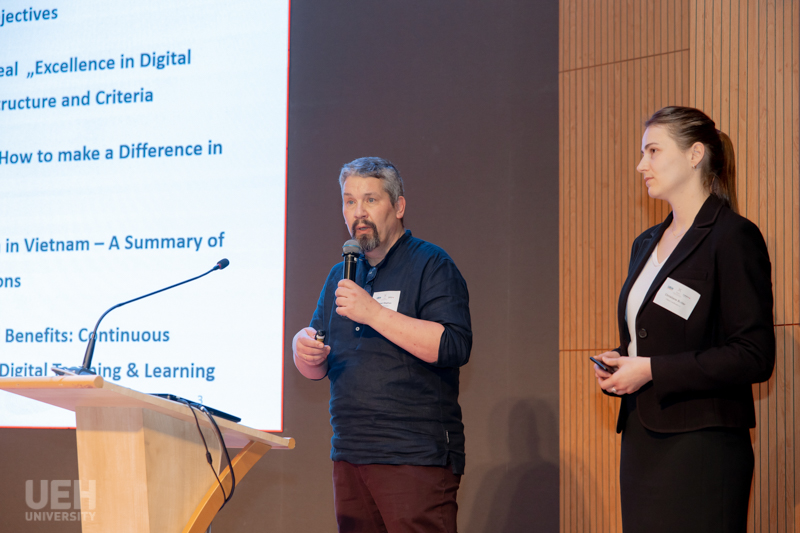
Mr. Michael Stephan, Head of Certification at FIBAA, shared his insights
*View the detailed presentation on digital education and the 'Excellence in Digital Education'® certification HERE
Sustainable Higher Education
Sustainable development in higher education is becoming an important trend, especially when universities play an important role in training high-quality human resources and promoting community initiatives.
With the purpose of assisting higher education institutions assess and develop their teaching, research and community activities in a sustainable manner in additiom to contributing to the achievement of the United Nations Sustainable Development Goals (SDGs), FIBAA (with expertise in educational quality accreditation) and Hobéon (with a background in assessing sustainability in education) have developed the “Sustainability in Higher Education” (SHE) certification - an assessment framework to measure the level of integration and implementation of the Sustainable Development Goals in higher education.
SHE assesses educational institutions according to the following 5 levels of development: (1) Ad hoc: No integration of SDGs; (2) Coherent: Linked but not synchronized; (3) Systematic: SDGs are implemented systematically; (4) Partner-oriented: Developed with external partners; (5) Impact on society: Creating significant social impact. The main criteria groups include: Objectives (Assessing the vision, strategy and learning objectives of the program related to SDGs); Human resources and organization (Examining the roles of lecturers, partnerships and organizational culture in promoting SDGs); Education and research (Assessing teaching methods and integration level of SDGs in research); Impact (Measuring the contribution of graduates, alumni and innovative initiatives to one society).
This SHE “Sustainable University” certification helps higher education institutions to perform the following missions: To evaluate and improve the quality of their teaching, research and community activities; To develop sustainable strategies in governance and operations; To contribute to the SDG implementation of the United Nations through education and research activities with positive social impacts.
“SHE certification will demonstrate that higher education institutions not only ensure training quality but also demonstrate a pioneering role in promoting sustainable development globally,” is what stated by Mr. Roel van Krieken, Hobéon Representative.
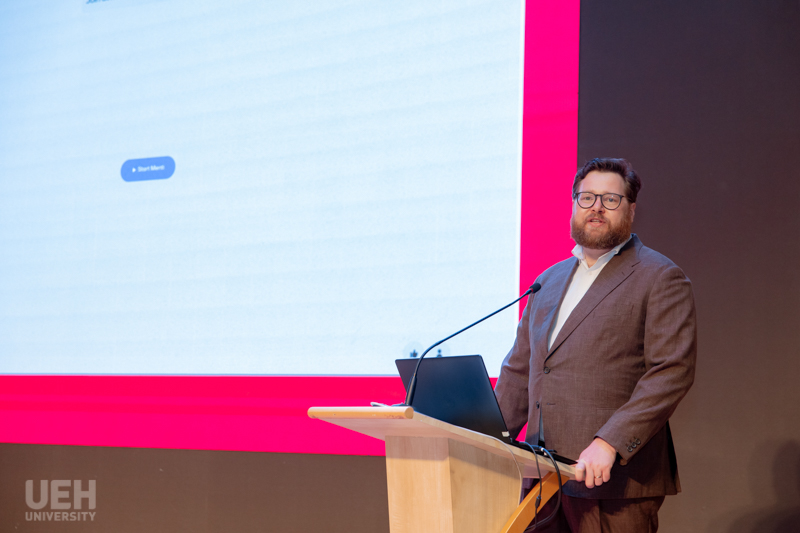
Mr. Roel van Krieken, representing Hobéon, shared insights on SHE
*View the detailed presentation on 'Sustainability in Higher Education' (SHE) HERE
The story of a pioneering university in digital transformation and sustainable action in Vietnam
Placing the Training pillar at the heart of the Multidisciplinary and Sustainable University strategy, University of Economics Ho Chi Minh City (UEH) identifies educational quality assessment as a key task and regularly self-assesses and improves quality to meet the educational quality assessment standards of prestigious domestic and international accreditation organizations. Therefore, UEH University has chosen FIBAA Educational Quality Assessment Organization as a partner for the 2020 – 2025 period. Up to the present time, UEH has had 19 training programs recognized as meeting FIBAA European standards and 7 training programs recognized as meeting AUN standards. Concurrently, it is the first higher education institution in Vietnam to achieve international accreditation at the FIBAA Educational Institution level.
In addition, UEH has been pioneering the implementation of the Sustainable University Strategy, integrating knowledge and principles of sustainable action into the 5 strategic pillars of Training - Research - Administration - Operation - Community Connection, aiming to implement the 17 Sustainable Development Goals (SDGs) of the United Nations. Below are the outstanding outcomes UEH has achieved in the past 5 years (2021-2025) with this strategy:
• Education: With the orientation of “Glo-cal Education - Empowering Global Citizens for Sustainable Development”, UEH has designed sustainable curriculums, implementing multidisciplinary and interdisciplinary training programs, lifelong learning methods, diversifying teaching methods, on-campus practice listed as Living Lab, cultural diversity and perspectives, expanding global and local partnerships, training global citizens - local actions, and diversifying activities to support learners and more.
• Management: Prioritizing sustainable development goals in vision - mission - action strategy, UEH annually plans a sustainable strategy to be implemented thoroughly and UEH-affiliated Units develop implementation plans, accordingly. Sustainable actions are implemented at the individual level through the OKR implementation mechanism (OKR or Objectives and Key Results). UEH University demonstrates their determination to implement by planning human resources through the establishment of the Sustainable University Project Board and developing a clear financial plan.
• Operation: Operation from the cycle to the green campus - UEH has researched and implemented the UEH Green Campus project. Up to the present time, this project has collected 6.4 tons of recyclable waste, approximately 35,000 plastic bottles and metal cans and transferred them to the recycling unit, more than 470,000 KhW of solar energy has been produced, approximately 60 events and activities to raise awareness of green living have been deployed to reach approximately 100,000 students and staff.
• Community: Establishing ArtTech Hub - a space to connect and to promote creativity in the field of sustainable art and technology and the International Forum on Sustainable Development (IFS) - is to create a network connecting domestic and international higher education institutions with the desire for sustainable transformation; promoting the strength of the UEH Youth Union - Student Association in sustainable implementation activities for the community and more.
“UEH's digital transformation and sustainable actions are the most practical commitment to future generations and the community. This journey requires the efforts of the entire system in many aspects, from the general to the detailed. We are very pleased that these contemporary higher education trends are curently being approached by FIBAA, the Ministry of Education and Training, and other international organizations from the accreditation of educational institutions and international training programs. This will help universities shorten the transformation roadmap in a directional and measured way” is what was emphasized by Assoc. Prof. Dr. Bui Quang Hung - Vice President of University of Economics Ho Chi Minh City (UEH).
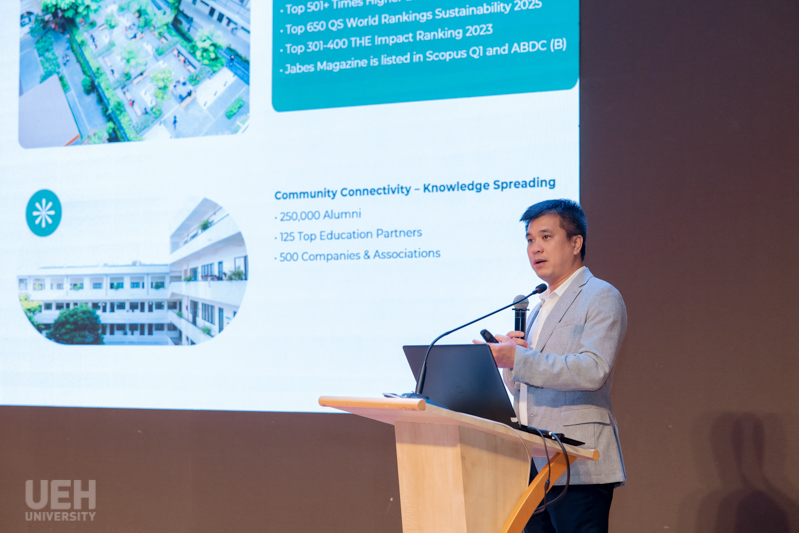
Assoc. Prof. Dr. Bui Quang Hung, Vice President of UEH, presented UEH's sustainable development strategy
*View the detailed presentation on the 'UEH Sustainable Strategy - 5 Years of Action' HERE
Additional images from the event:
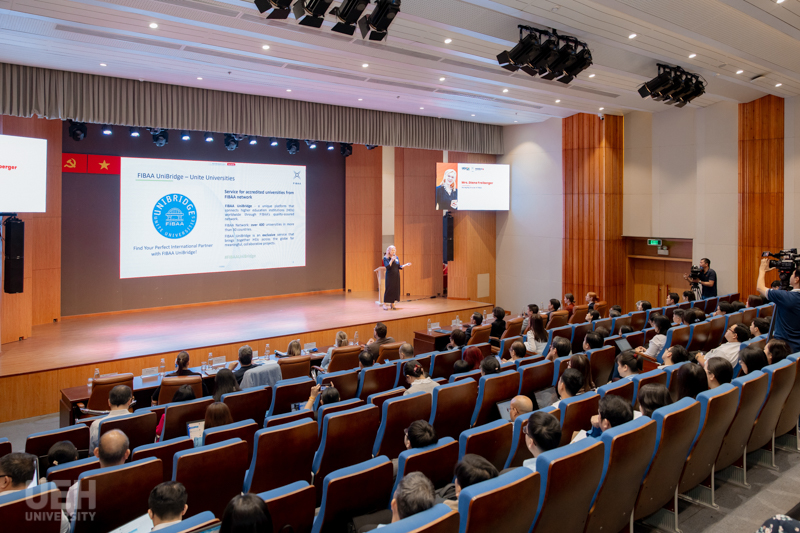
The seminar brought together numerous education experts and representatives from Vietnamese universities
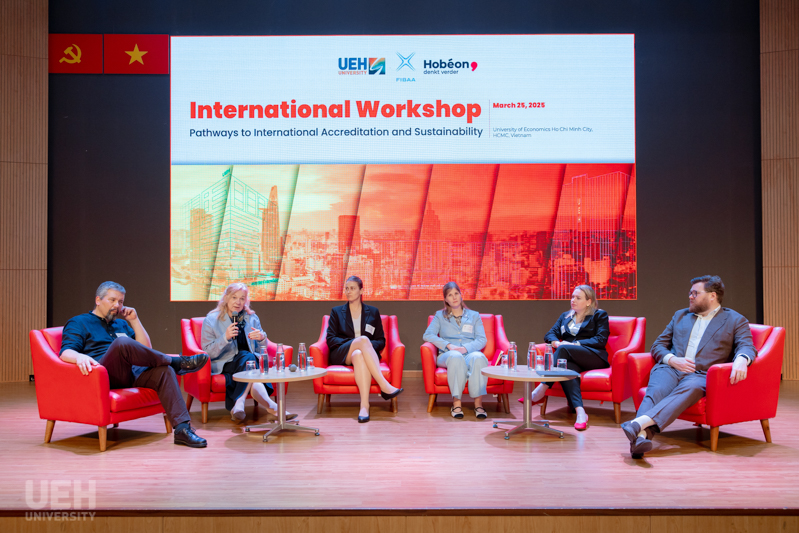
The discussion session featured the sharing of various important topics
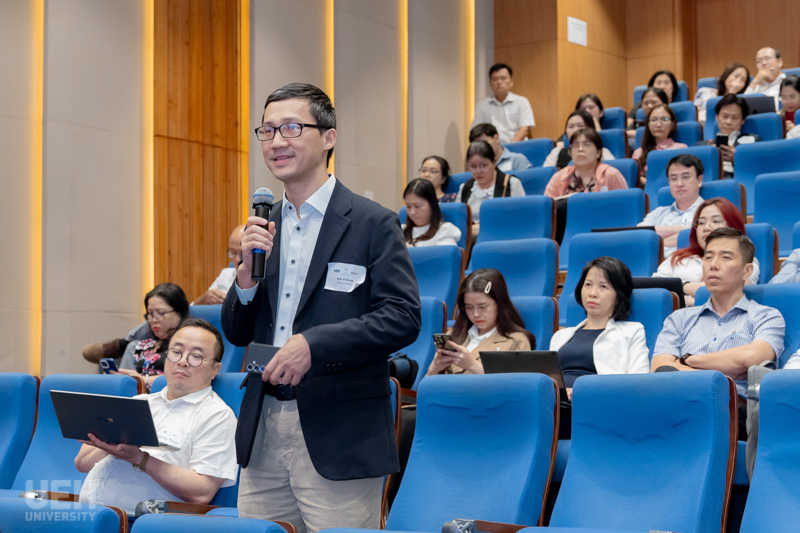
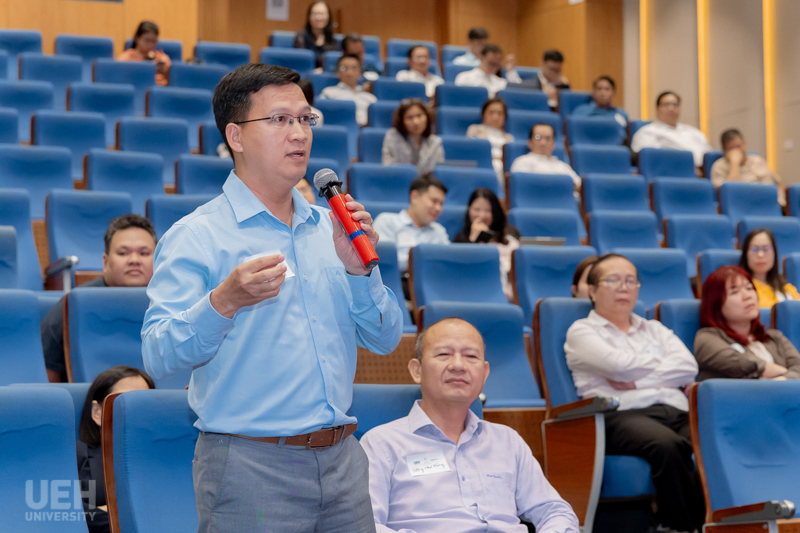
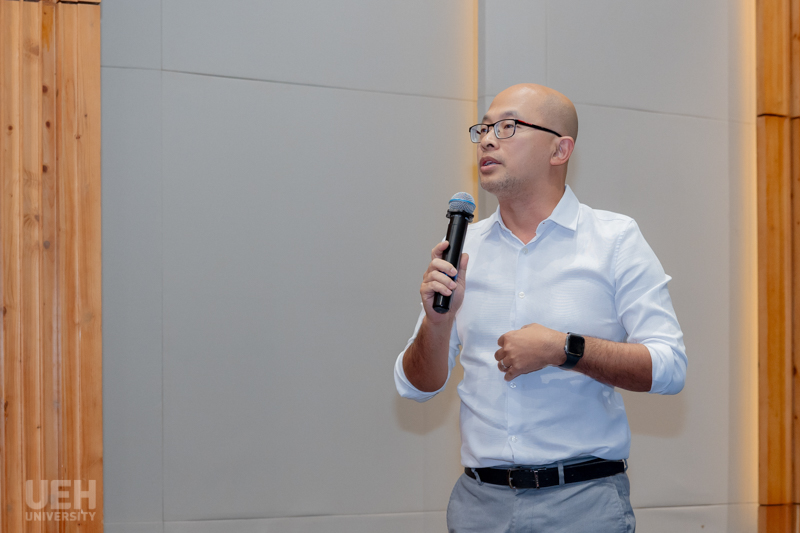
Numerous questions from attendees to the speakers reflected the audience's strong interest in the seminar
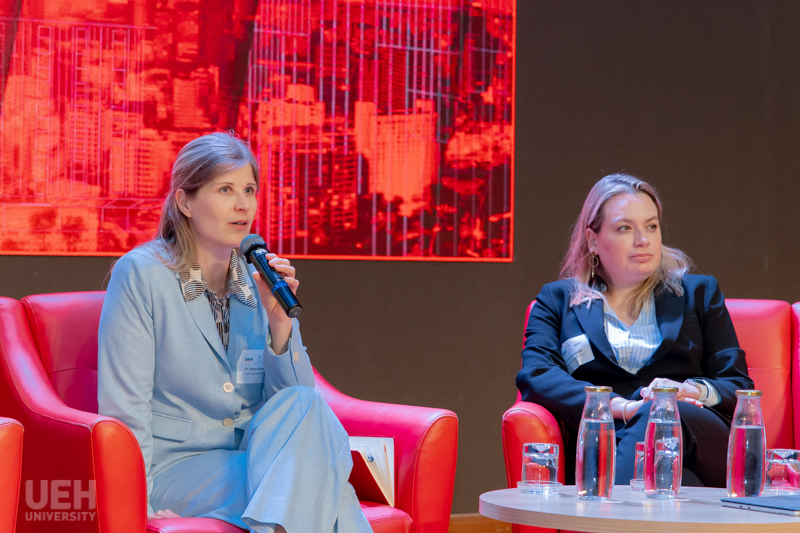
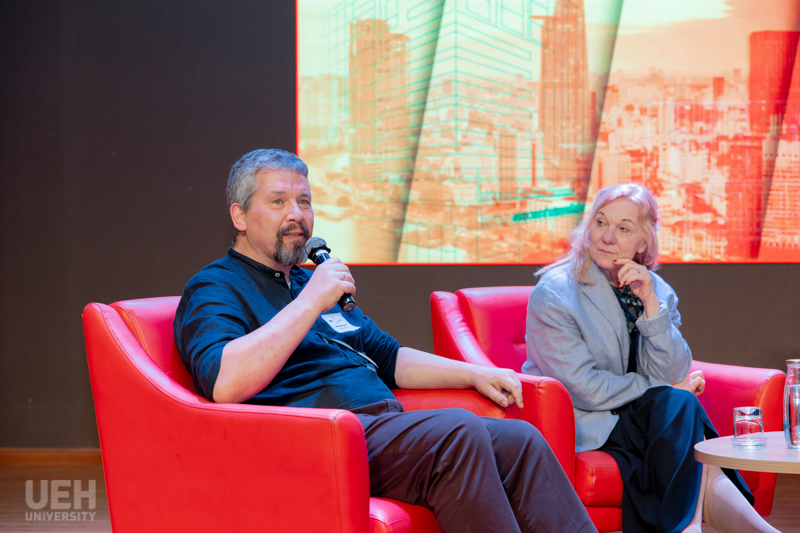

Speakers addressed the attendees' questions
News, photos: Department of Communications and Partnerships, Department of Quality Assurance and Internal Control



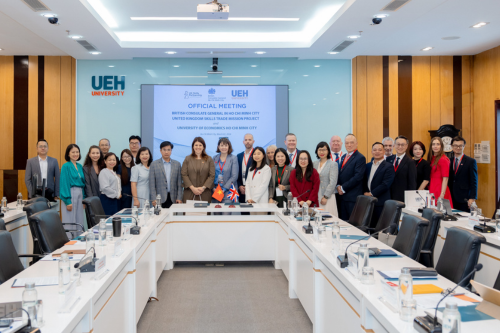


![[Research Contribution] The influence of greenwashing on green purchasing intentions in the electric motorbike sector: the mediating role of green brand trust and green word-of-mouth of GenZ](/images/upload/thumbnail/ueh-thumbnail-639081264718342243.png)
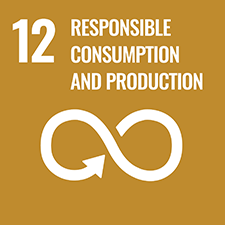
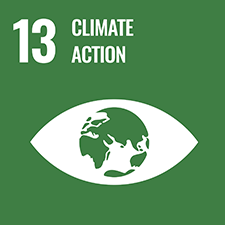
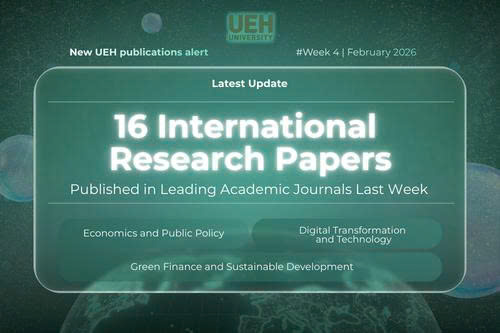

![[UEH 50 Years] From Knowledge Legacy – Human Strength – To a Sustainable Future: Writing the Next Remarkable 50 Years Together with UEH](/images/upload/thumbnail/ueh-thumbnail-639080371906093816.png)
![[Research Contribution] Criminal Procedure for Prosecuting Commercial Legal Entities: New Regulations, Challenges, and Enforcement Solutions](/images/upload/thumbnail/ueh-thumbnail-639078027620151681.png)
